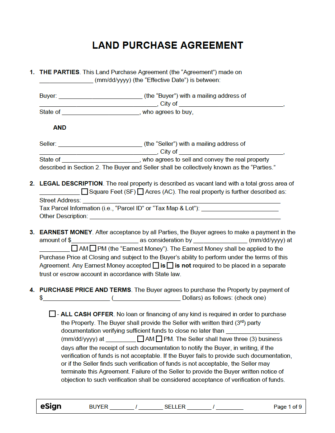

A land purchase agreement is a contract used for selling land from one person or entity to another. It identifies the names of the buyer and seller, the amount of money the land is selling for, the date the closing will occur, and other terms and conditions the buyer and seller agree to follow.
Also known as a:

A land purchase agreement is a form used for making an initial offer on a vacant piece of land and for outlining the terms of the purchase (as long as the seller agrees to the offer). The document is completed by the person interested in buying the property, who will need to conduct research, inspections, and surveys on the land in order to complete the entire document. Once the seller receives the document, they will either approve, reject, or submit a counter-offer to the potential buyer.
If the buyer is working with a realtor, the realtor will often handle the majority (if not all) of the paperwork and negotiating during the purchase process.
The term “land contract” often refers to installment contracts, which are a type of purchase agreement in which the seller of the land finances the deal themselves. Instead of having the buyer pay cash, go through a bank, or acquire funding from another third (3rd) party, they make regular payments to the seller until the full price of the land is paid for.
Installment contracts are recommended when the buyer can’t obtain financing due to a low credit score or another valid reason. In regard to the information included on this page, “land contracts” will refer to a general land purchase agreement.
Like residential properties, land purchases involve several factors that can impact the sale price. The following list includes some of these factors:
The most important factor that plays into the price of a plot of land is how close it is to urban locales. This can include bodies of water, attractions, convenient amenities, and work hubs. In other words, the more isolated a plot of land, the lower the price will be, generally speaking.
While often overlooked, the easier it is to have utilities installed (or the more available they are) to a plot of land, the more valuable that land will be. Such utilities include cable, electricity, sewer (if no septic system), trash collection, phone lines, etc.
The quality of the soil can vastly affect the price of the land, particularly if it will be used for agricultural or farming purposes. Additionally, septic systems require soil that can absorb water at a specific rate. If the soil doesn’t fit the requirement, sewer lines would be required.
“Minerals” refers to any valuable resource that is located underneath (or on the surface of) the land. This can include oil, natural gas, coal, precious metals, stone, clay, and more. It is possible that the owner of the land has already conveyed the mineral rights to another person or entity. Whether or not the mineral rights have been conveyed can heavily impact the value of the land.
More often than not, the mineral rights will be included in the purchase of land. Additionally, the process of finding out if mineral rights exist can be costly and time-consuming (mineral rights will rarely show up with a title search), not to mention land in populated areas is rarely excavated for resources.
The number of “usable” acres a plot of land has will impact the land’s value far more than the gross number of acres on the property. What constitutes “usable” can vary, although it is generally considered to be land that can be used for industrial/agricultural purposes (such as farmland) or land that is suitable for building residential or commercial structures. “Unusable” land includes any type of land that offers little value, due to it being unsuitable for building or resources. This can include drainage ditches, wetlands, sidewalks, and steep terrain (to name a few).